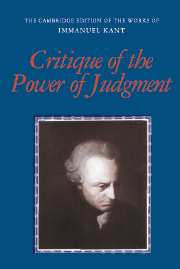Book contents
- Frontmatter
- Contents
- General editors' preface
- Editor's introduction
- First Introduction to the Critique of the Power of Judgment
- Critique of the Power of Judgment
- Preface
- Introduction
- First Part: Critique of the Aesthetic Power of Judgment
- Second Part: Critique of the Teleological Power of Judgment
- Appendix: Methodology of the Teleological Power of Judgment
- Method of citation and abbreviations
- Editorial notes
- Glossary
- Index
Preface
Published online by Cambridge University Press: 05 April 2013
- Frontmatter
- Contents
- General editors' preface
- Editor's introduction
- First Introduction to the Critique of the Power of Judgment
- Critique of the Power of Judgment
- Preface
- Introduction
- First Part: Critique of the Aesthetic Power of Judgment
- Second Part: Critique of the Teleological Power of Judgment
- Appendix: Methodology of the Teleological Power of Judgment
- Method of citation and abbreviations
- Editorial notes
- Glossary
- Index
Summary
The faculty of cognition from a priori principles can be called pure reason, and the investigation of its possibility and boundaries in general can be called the critique of pure reason; although by this faculty only reason in its theoretical use is understood, as was also the case in the first work under this title, without bringing into the investigation its capacity as practical reason, in accordance with its special principles. The former pertains solely to our faculty for cognizing things a priori, and thus concerns itself only with the faculty of cognition, excluding the feeling of pleasure and displeasure and the faculty of desire; and among the faculties of cognition it concerns itself only with the understanding in accordance with its a priori principles, excluding the power of judgment and reason (as faculties likewise belonging to theoretical cognition), because in the course of that work it turns out that no faculty of cognition except for the understanding can yield constitutive principles of cognition a priori.
- Type
- Chapter
- Information
- Critique of the Power of Judgment , pp. 55 - 58Publisher: Cambridge University PressPrint publication year: 2000
- 2
- Cited by

